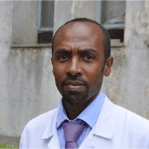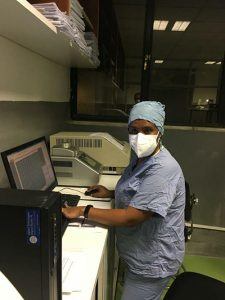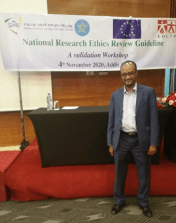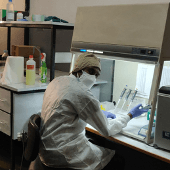Meet Solomon Teferra, principal investigator and head, Department of Psychiatry, Addis Ababa University and visiting scientist in the Department of Epidemiology, Harvard T.H. Chan School of Public Health and Tamrat Abebe, project lab lead and assistant professor of microbiology and immunology, Addis Ababa University of the Neuropsychiatric Genetics in African Populations (NeuroGAP) project in Ethiopia. In the following Q&A find out how they adapted their lab to help process COVID-19 samples and tests during the pandemic.
Can you tell us about the lab that was set up in Addis Ababa, Ethiopia as part of the NeuroGAP-Psychosis project? What role does it play in the process and extraction of DNA samples for NeuroGAP-Psychosis?

Abebe: The lab was established on July 17, 2017 as a molecular laboratory of the Department of Microbiology, Immunology, and Parasitology (DMIP). It is located on the 5th floor of College of Health Sciences (CHS) building of Tikur Anbessa Specialized Hospital (TASH) campus. The lab has seven sections (Donning & Doffing area, master mix room, sample reception room, DNA extraction room, PCR room, post-PCR room and cleaning room). The lab has basic equipment including level-II biosafety cabinets, conventional and real time PCR machines, various centrifuges, vortex, water bath, heating blocks, nano drop, and ELISpot machine. The size of the lab is 25.5 by 6 m. Several academic staff members of DMIP (12 people) who are PhD/MSc candidates and Welelta the NeuroGap research lab technologist is working in the lab. Since April 2018 the lab is serving as a DNA extraction site for NeuroGAP-Psychosis project.
How did it also become a center for COVID sample processing and testing? Whose idea was it? What type of work is being done there now? How does it fit into the overall COVID testing structure in Ethiopia (what areas does it serve? Where do the tests come from)?

Abebe: The first COVID-19 case was reported in Ethiopia on March 13, 2020. At that time samples were sent to South Africa for testing. This was followed by the establishment of SARS-CoV-2 testing lab at Ethiopian Public Health Institute (EPHI). The hospital started to send samples following the national protocols to EPHI, the only lab responsible for testing SARS-CoV-2 at that time. This has affected the hospital service significantly because it has been taking a week or more to get SARS-CoV-2 results. Discussions were initiated by the College and hospital admin with Ministry of Health (MOH) and Ethiopian Public Health Institute (EPHI) to establish SARS-CoV-2 lab at TASH. In the meantime, as a health care professional, we the lab medicine professionals were discussing how we can contribute to the continuity of the hospital service in this thrilling time. We were approached by the College administration. Our German collaborator Dr. Kantelhardt from University of Halle also promised to purchase RT-PCR kits and CFX96 Touch Real-Time PCR Detection System – Bio-Rad from the clinical partnership ongoing project fund after discussing with donors. This has further motivated us.
But as the RT-PCR based testing and manual RNA extraction is very demanding and the spread of the pandemic was horrendous, it required further discussion among the people working in the lab if we can voluntarily participate in this very demanding work. All the discussants agreed to participate voluntarily and terms of reference (TOR) has been developed and shared with TASH. The lab has been assessed and accredited by EPHI to conduct SARS-CoV-2 with some recommendations. The recommendations include some re-structuring of the lab as well as installation of an air conditioner NeuroGap-Psychosis project was very supportive in this regard.
The RT-PCR SARS-CoV-2 testing was started on June 14, 2020 and we have been serving the patients attending TASH since then. Our turnaround time (TAT) is about 13 hours and so far, we tested 6000 TASH patients and staff. Our effort is gratitude as a game changer of the hospital services by the College and hospital administration. Besides, we have also participated in the COMBAT project of EPHI and tested about over 6000 community samples within 2 weeks. Welelta, the NeuroGap research lab technologist, was one of the key personnel in the lab in the establishment, day to day activity of the lab and development of standard operating procedures (SOPs) whenever, new kits are supplied to us by EPHI, the national institute organizing SARS-CoV-2 testing. Currently in Ethiopia there are over 50 SARS-CoV-2 testing labs and we are among the very few Hospital-based labs.
The origins of the study have an interesting set up story—I understand Karestan Koenen went to Addis to make the case for it at the Ministry of Science and Technology as well as the national IRB. What was their initial response? What convinced them to approve this project?

Teferra: The initial response to such huge genetics project that was never done in Ethiopia before was guarded as there was no experience or capacity to do ethics review of such proposal. The PI in Ethiopia (Dr. Solomon) was given the opportunity to appear before the National Ethics Committee. I had to consult with Dr. Koenen and other ethics expert colleagues to address controversial issues such as broad consent, storage of samples and the language in the consent form. Experiences from other centers and the NIH were consulted. I made a Powerpoint presentation on the project including recent developments in psychiatric genetics before the panel of the national ethics committee. After thorough discussion and a Q&A session, the approval was granted with the support from the leadership of Ministry of Science and Technology. There was also a request by the National Health Research Ethics Review Committee (NHRERC) for a session on issues around psychiatric genetics. To address this request, I invited Dr. Koenen to make a presentation on ethics of psychiatric genetics in the presence of nearly 50 local scientists including the NHRERC members and higher officials from The Ministry of Science and Technology. Dr. Koenen’s presentation was well received with an insightful Q&A session from the participants, chaired by the Chair of the NHRERC.
Has this had any impact on the scope of the NeuroGAP-Psychosis project? If so, how? Any unexpected challenges or benefits?
Teferra: The challenges in capacity to review large scale genetics projects was the reason for launching The African Ethics Working Group (AEWG) led by Global Initiative in Neuropsychiatric Ethics (NeuroGenE) based at the University of Oxford. This initiative, financially supported by the Stanley Center Global Collections Initiative, embarked on capacity building training and research projects on the ethics of psychiatric genetics involving experts from Ethiopia, Kenya, Uganda and South Africa. Three senior experts from Ethiopia, including the chair of the National Health Research Ethics Review Committee (NHRERC), have been participating in this initiative. As a consequence of this, the National Research Ethics Guideline in Ethiopia has been revised, with major expansion and changes in the section for ethics review of genetics research. I have participated in the national validation workshop that was held on November 4, 2020 at the Hilton Addis Ababa hotel. Under the new structure of the executive organ of the government, the National Health Research Ethics Review Committee has been relocated to the Ministry of Science and Higher Education (MoSHE). Higher officials from the Ministry and experts involved in ethics review from across the country have attended the workshop and contributed to the enrichment of the document. Notable changes regarding ethics of genetics research include the addition of different forms of consent and the requirement for establishment of biobanks for storing genetic materials locally. This development can be hailed as one important contribution of NeuroGAP-Psychosis project for capacity building in Ethiopia.
What are your future plans for this lab?

Abebe: The short-term plan of the lab is to continue the work on SARS-CoV-2 testing generating evidence to understand more about the pandemic in individuals with underlying health conditions alongside the research work conducted in the lab. In the coming five years we plan to have a state-of-art clinical and research laboratory service and technology. Our overarching goal is to advance knowledge and improve healthcare outcomes with emphasis on translational research with the advent of “big-data’’ and precision medicine. To meet this goal, we will keep on hunting investigator and/or institution-initiated grants with special focus on team, multicenter,and interdisciplinary grants.
-Coppelia Liebenthal



